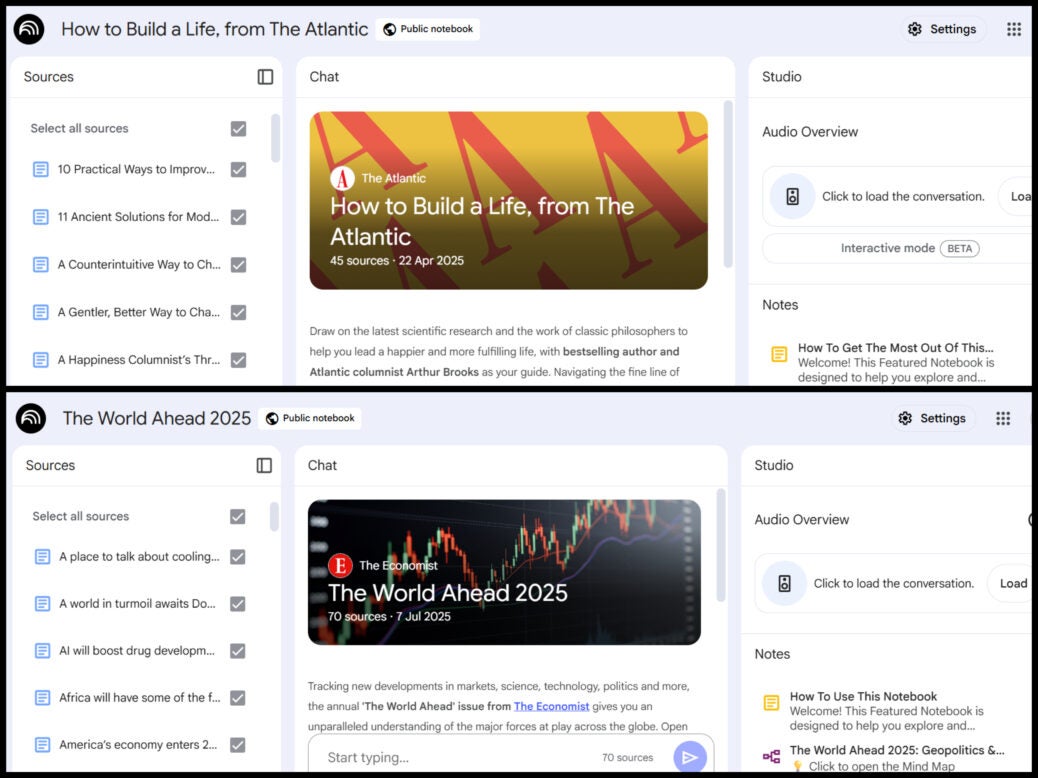
The Atlantic and The Economist are among eight initial partners to have created “featured notebooks” within Google’s NotebookLM.
NotebookLM is Google’s AI-powered research and note-taking tool that allows users to upload documents and then ask questions about them, generate summaries and create podcasts based on the content. It grounds AI responses in specific, curated documents rather than drawing from the broader web.
These partnerships allow readers to engage with the publishers’ material in an interactive experience, by posing questions and receiving answers cited from the original sources, and exploring topics in depth including via audio overviews and mind maps.
NotebookLM’s eight featured notebooks are curated collections of information from expert partners, “freely available to users because they involve public domain information or because we have secured world rights for the material from the original authors or publishers”, explained Steven Johnson, editorial director at Google Labs, in a Medium post.
The publisher-led collections, alongside other featured notebooks covering subjects from scientific explorations and parenting advice to Shakespeare, enable users to engage with content using all of NotebookLM’s features.
The Economist’s featured notebook is based on its annual The World Ahead report, incorporating high-level geopolitical and economic analysis directly from experts.
“It’s really taking our content as the starting point, as the focus, as the center of the proposition, and then it’s helping our readers to engage with that content in a differentiated experience”, explained Jennifer Devereux, director of corporate development and EVP strategic partnerships at The Economist.
The Economist’s partnership with NotebookLM represents a strategic move to explore AI-driven reader experiences while maintaining editorial control. Users can explore The Economist’s journalism through different pathways, according to Devereux.
“They can really immerse themselves in that content, which I think is so aligned with what we are trying to create with The Economist experience, taking that quality journalism, the trustworthiness, the rigorous reporting, and creating a different experience [with] that content”, she said.
“People can cut into it, explore themes, and I think that was what was so compelling about this when Google brought it to us.”
The collaboration also fits within The Economist’s broader AI strategy. “It’s really interesting way of collaborating with somebody who is a leading figure in AI development and giving us the chance to explore what that might mean for our content and for our users in a very collaborative manner,” Devereux said.
While Google controls the platform and the data access, Devereux said they’re keen to see from Google a sense of who users are, how many users engage with it and some of the queries they’re asking.
This is just one way The Economist is experimenting with AI, also including AI-translated content on its “snack-sized” Espresso app, AI-translated videos for social media, a style bot and fact-checking.
“Our AI strategy is built on a principle of creating engaging and differentiated AI powered experiences based on the rigorous, in-depth and independent journalism of The Economist,” Luke Bradley-Jones, president at The Economist said in a statement. “Our partnership with Google is consistent with this approach and we look forward to learning from this collaboration.”
At The Atlantic, the NotebookLM collaboration takes the form of an advice notebook based on bestselling author Arthur C. Brooks’ How to Build A Life columns. This allows readers to delve into Brooks’ insights on wellbeing and life advice within a structured, interactive format.
“The books of the future won’t just be static: some will talk to you, some will evolve with you, and some will exist in forms we can’t imagine now. We’re delighted to partner with Google in its pioneering work on this front,” Nicholas Thompson, CEO of The Atlantic said in a statement.
The featured notebook launches followed NotebookLM’s recent introduction of public sharing, which has seen over 140,000 public notebooks created in four weeks.
While NotebookLM has been thought of as a tool for understanding and exploring information, Google’s Johnson envisioned it as “an AI-first distribution platform, amplifying expert knowledge on a wide range of topics”, he wrote. Through featured notebooks, readers move beyond passive consumption to active exploration, with conversations happening in over 80 languages.
“It’s the adaptability of the notebook format that I think makes this such a compelling platform for sharing knowledge. You can read the original texts in their entirety; you can ask questions or brainstorm ideas through a conversational interface, with citations pointing you back to the relevant passages from the original sources,” he wrote.
Google says it will “continue to introduce new featured notebooks, including additional collections from our partnerships with The Economist and The Atlantic”, suggesting scope for more publisher collaborations.
Publishers have raised concerns about other parts of Google’s AI ecosystem, particularly AI Overviews in Search, where content is scraped and summarised without their involvement. NotebookLM’s approach is different as publishers directly curate and contribute their own content collections.
Email pged@pressgazette.co.uk to point out mistakes, provide story tips or send in a letter for publication on our "Letters Page" blog
